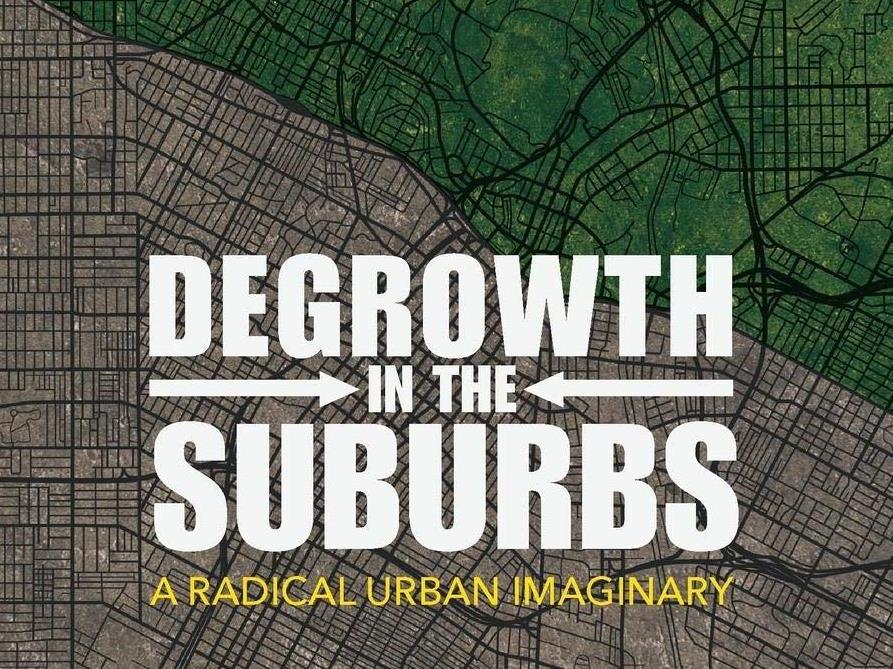Samuel Alexander and Brendan Gleeson’s Degrowth in the Suburbs published by Palgrave Macmillan.
Degrowth in the Suburbs suggests and explores a significant range of actions that could mitigate the disaster our planet is hurtling towards.
Samuel Alexander and Brendan Gleeson refer to a recent study by the United Nations estimating that the Earth is heading to a population of ‘around 9.8 billion by mid-century and more than 11 billion by 2100.’ Doubtless this represents an unsustainable rate of population increase. At the same time, the Earth is heading towards a temperature increase of 3°C while ‘there is a growing recognition amongst scientists that a temperature rise of 2°C is far too risky’. The authors contend that even at a temperature of 1.5°C above pre-industrial levels ‘many low-lying islands and coastal cities are at grave risk of being submerged’.
The authors accept that it is already too late to avoid many of the disasters that flow from the way humankind has misused the planet. To those that contend these disasters include the end of suburban life such as currently experienced in Melbourne, for instance, they state that their purpose in writing this book is ‘to chart a course between the Scylla of catastrophe and the Charybdis of false hope, and see whether the descent ahead may yet entail a reconceived prosperity’.
Alexander and Gleeson maintain that the only realistic long-term solution to the world’s problems is to decrease our use of energy and resources. This is what they mean by the term ‘degrowth’. They state their case at length, in detail, with conviction, and with an abundance of references. Their reasoning is evidence-based and well-articulated. They acknowledge the value of a range of other solutions to some of the world’s problems and explain why they deem them inadequate or flawed.
The authors acknowledge that even in the extremely unlikely event of an Australian government wanting to adopt a policy of degrowth, it would be politically impossible at present, and they give reasons why this is the case. They argue that an overwhelming grass-roots movement of suburbanites would be required to achieve the cultural change needed to adopt degrowth. Chapter 4, ‘Resettling Suburbia: A Post-capitalist Politics “From Below”’ deals with the exisiting grass-roots movements and the remote possibility that they might morph into an effective degrowth movement in the current environment.
Chapter 6 is one of the most intriguing sections of the book. In it, the authors place themselves in the world as they expect it to exist in 2038, focusing primarily on Australia. They aver that in 20 years from now, popular acceptance of degrowth will not be a utopian fantasy but rather a human response to the crisis resulting from ‘capitalism finally chok[ing] on its own growth fetish’. They envision a ‘movement’ that brought together various trends such as ‘permaculture, voluntary simplicity, degrowth, transition, climate justice, collaborative consumption, localisation, eco-socialism and more’. Basically they argue that things will have to get very bad indeed before degrowth is likely to happen.
For a book such as this a very important question arises: who is the intended readership? If this book is aimed at fellow academics then it ticks all the boxes. If it is aimed at the inhabitants of prosperous suburbs, it may encourage them to a more self-sustaining lifestyle. If it is aimed at those who believe in capitalism and the present order of things, it doesn’t help to quote Marx and Engels in the opening paragraphs. And the first chapter would be more persuasive if the reader would not have to wait until page 17 for a clear statement of the problem and page 22 for a definition of suburbia. It is entrenched capitalists who should read this book and they would be more likely to do so if the opening chapter were more welcoming.
3 ½ stars ★★★☆Degrowth in the Suburbs
A Radical Urban Imaginary
By Sam Alexander and Brendan Gleeson
Copyright 2019
Publisher Palgrave Macmillan
ISBN 978-981-13-2131-6
Topics
Urban Studies/Sociology





